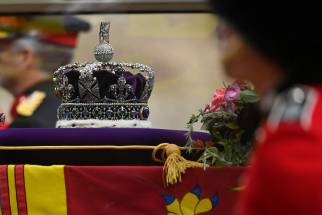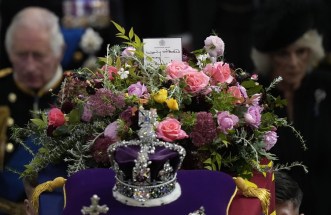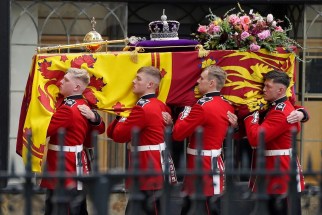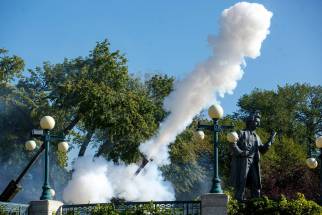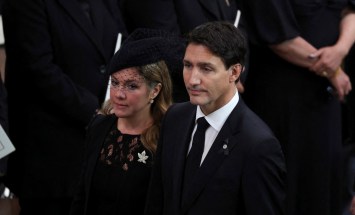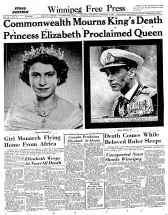A reminder that politics can be respectful
Read this article for free:
or
Already have an account? Log in here »
To continue reading, please subscribe:
Monthly Digital Subscription
$0 for the first 4 weeks*
- Enjoy unlimited reading on winnipegfreepress.com
- Read the E-Edition, our digital replica newspaper
- Access News Break, our award-winning app
- Play interactive puzzles
*No charge for 4 weeks then price increases to the regular rate of $19.00 plus GST every four weeks. Offer available to new and qualified returning subscribers only. Cancel any time.
Monthly Digital Subscription
$4.75/week*
- Enjoy unlimited reading on winnipegfreepress.com
- Read the E-Edition, our digital replica newspaper
- Access News Break, our award-winning app
- Play interactive puzzles
*Billed as $19 plus GST every four weeks. Cancel any time.
To continue reading, please subscribe:
Add Free Press access to your Brandon Sun subscription for only an additional
$1 for the first 4 weeks*
*Your next subscription payment will increase by $1.00 and you will be charged $16.99 plus GST for four weeks. After four weeks, your payment will increase to $23.99 plus GST every four weeks.
Read unlimited articles for free today:
or
Already have an account? Log in here »
Hey there, time traveller!
This article was published 19/09/2022 (1182 days ago), so information in it may no longer be current.
Perhaps it was a moment infused with the calm solemnity of the occasion. Maybe it’s a reflection of attitudes from a bygone era. But it also serves as reminder of what could — and, indeed, should — be a guiding principle in contemporary politics in Canada and beyond.
Summed up in a single word: respect.
The presence of four former Canadian prime ministers (Jean Chrétien, Paul Martin, Kim Campbell and Stephen Harper), as well as current Prime Minister Justin Trudeau, at the royal funeral of Queen Elizabeth II in London offered a rare glimpse of across-party-lines unity in which political rancour was absent and a mutual respect for public service was the order of the day.
In addition to being among the Canadian dignitaries in London to pay respects to the monarch who served as titular head of state for Great Britain and the Commonwealth for 70 years, the current and former PMs set aside time to gather Sunday for the investiture of Mr. Harper into the Order of Canada.
A picture posted to Twitter on Monday by Mr. Harper shows the five Canadian leaders standing shoulder to shoulder, smiling; the photo is accompanied by text indicating the new Order of Canada member’s gratitude for the others’ presence at the ceremony.
PMO PHOTOS BY ADAM SCOTTI From left, former prime ministers Paul Martin and Kim Campbell, Prime Minister Justin Trudeau, and former prime ministers Stephen Harper and Jean Chrétien.
This rare (by current political-discourse standards, at least) moment of non-partisan mutual respect was reflective of the overall attitude that infused the days leading up to the state funeral of Queen Elizabeth. It drew dignitaries of various political inclinations from around the globe and was defined, for all intents and purposes, by the kilometres-long queue in which Britons and visitors from abroad waited patiently and interacted pleasantly while inching slowly — in many cases, for 24 to 30 hours — toward their opportunity to pay a few moments’ solemn respects while passing by the queen’s casket inside Westminster Hall.
Queen Elizabeth clearly transcended the political divides and bunkered ideological thinking that have come to dominate the current conversation in Canada, the United States and many other western nations. Such was the manner with which she comported herself during her seven decades on the throne that even otherwise-bitter political rivals seemed inclined to lay down their figurative swords long enough to bear calm, quiet and reflective witness to the ceremonial end of a beloved monarch’s reign.
Meanwhile, back in North America, former U.S. president Donald Trump held a rally in Ohio at which he once and for all untethered himself from any semblance of political discretion, openly embracing bizarre Q-Anon conspiracy theories, employing what is perceived to be an anthemic song embraced by that far-right group’s members, and reveling in the cheers as the event’s attendees directed raised-arm salutes reminiscent of those employed at Hitler-era Nazi rallies.
The current tone of politics on both sides of the Canada/U.S. divide makes the weekend gathering of Canadian PMs seem rather quaint.
North of the border, newly minted Conservative Party of Canada Leader Pierre Poilievre continues down the rhetorical path that swept him to victory over his leadership rivals, repeating populist buzz-phrases that made him a favourite of the “freedom convoy” crowd by decrying government overreach and the efforts of “elites” to keep ordinary people down, while dismissing or vaguely demonizing those who question his populist message.
The current tone of politics on both sides of the Canada/U.S. divide makes the weekend gathering of Canadian PMs seem rather quaint. One might hope it would serve as inspiration for a push toward a more civil public conversation, but the likelihood is more that such a restrained gathering of erstwhile political foes will be regarded as a sepia-toned reminder of times gone by and a respectful demeanour not likely to be seen again.


